Ottawa compounding pharmacies offer alternative to over-the-counter care
Posted Apr 28, 2021 01:00:00 PM.
Big-box pharmacies today rely on global pharmaceutical giants for their medicines.
In most cases, commercial pharmacare works well. However, when it comes to drugs, one size doesn't always fit all, for example, when a patient is allergic to their prescribed medication, or their drugs have nasty side effects.
That's when many in Ottawa go to a compounding pharmacy like Watson's Pharmacy and Compounding Centre.
Compounding pharmacies like Watson's make medicine for people who can't, or prefer not to take commercially produced drugs for a variety of reasons such as children who can't swallow capsules, or seniors who want options other than addictive opioids.
For these special cases, Watson's Pharmacy Owner Scott Watson, 52, can make transdermal ointments, liquid suspensions, suppositories and capsules in his on-site compounding lab.
There aren't many medical puzzles Watson says he and his dispensary crew can't solve. Occasionally, he'll get unusual requests, like the hospital asking him to make a prescribed medicine without an agent the patient is allergic to, or a vet that needs a transdermal ointment for a cat that won't swallow a pill.
Every drug is made to precise standards set out by the National Association of Pharmacy Regulatory Agency. Some compounding pharmacies use marijuana or CBDs. Watson's doesn't.
The growing popularity of compounding and alternative medicines, medical marijuana and homeopathy primarily, show how fast the marketplace for pharmaceuticals is changing. People are looking for outside-the-box solutions.
“Every time I'm handed a prescription, I try to think of a better medical option, a compounding solution that may work better,” Watson says. “Most of the drugs manufactured by the big pharmaceutical companies today are excellent, however, they aren't the only solution.”
A native of small-town Alberta, Watson studied pharmacy at the University of Alberta. After graduating with a degree in drug design, he headed east and cut his teeth dispensing at the Glebe Apothecary, where he was able to “be creative inside the lab.” Watson and his wife Katy opened their first pharmacy on Main Street in Ottawa, then added a second location on Wellington Street in 2012.
While all pharmacists know the basics of compounding, those who work in big box drug stores don't have the time to make drugs anymore, explains Watson. Compounding with chemicals is a labour intensive process. In order to make drugs, it's important that the compounding pharmacist know the doctor's intentions, the purpose of the medicine, and the patient's pharmaceutical history.
Patients appreciate Watson's attention to detail.
“The other day, a woman came back to the pharmacy in tears because the product I designed for her worked well, better than anything else she had taken,” he adds. “'It's like magic,' she said. 'It's the first time in months I haven't felt pain.' I get similar reactions here all the time.”
“It's not easy to see a doctor who has your history today,” Watson says. “Many people today don't have a doctor, they have to go to a clinic, and they may not have received the patient's history. We have your history. When a prescription comes through us, we ensure the medicine is right for that specific patient. We have to be more personal. The pharmacist at Shopper's Drug Mart can be personal too, but because we're a smaller operation, we get to know people. People often ask us if there was something we could make that would be right for their condition. It's a challenge I love as a pharmacist.”








